Content
Pickled cucumbers become soft in the jar for many housewives, but this situation is not normal. Cooked vegetables should be strong and crunchy, and the softness indicates that they are tainted.
Why canned cucumbers become soft
Some mistakes made when preserving cucumbers are quite realistic to correct and save the harvest. But if the cucumbers become soft after salting, they will not be able to return their density and crunchiness.
So that the cucumbers in the jar do not have to be disposed of, it is necessary to preserve correctly from the beginning. And for this, you should know what mistakes lead to softening of pickles.
Violation of sterilization technology
Pickled cucumbers in a jar can retain their qualities for many months only if there are no harmful microorganisms in the jar. That is why it is customary to thoroughly sterilize the jar before salting.
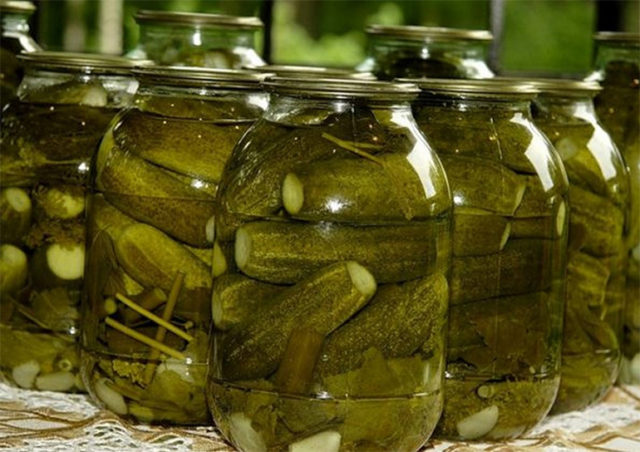
If sterilization was insufficient, the workpiece will quickly deteriorate.
Sometimes housewives approach the sterilization process of containers not carefully enough. After pickling, cucumbers become soft if:
- the jar is poorly washed, and dirt or detergent residues remain on its walls;
- sterilization was not carried out for a long time and did not bring the desired effect;
- the jar was not completely processed, and sterilization did not affect its neck, on which dirt and microbes often accumulate;
- during the processing of containers, no attention was paid to the closures for seaming.
It is necessary to sterilize the salting container in accordance with all the rules, following all the prescribed steps. It is impossible to shorten the sterilization time, it is better to exceed it a little than to finish the treatment ahead of time. Together with the jar, it is imperative to process the lids, since their cleanliness is also of great importance when preserving pickles.
Lack of tightness
Pickled cucumbers can become soft due to the fact that the jar with the workpiece was closed too loosely, and it was not possible to achieve complete tightness. If air seeps into the inside of the jar through at least a small hole, fermentation processes will begin in the brine, and the vegetables will become soft.
The tightness in the workpieces is most often violated due to the following points:
- poor-quality caps that do not fit tightly to the neck;
- defects on the neck of the can, chips, cracks and cracks;
- a faulty can seaming machine that does not cope with its functions.
Also, the tightness can be broken already during storage, if you inadvertently drop or hit the jar. Sometimes the container remains intact at first glance, but the lid gets off, or microcracks form, allowing air to pass through.
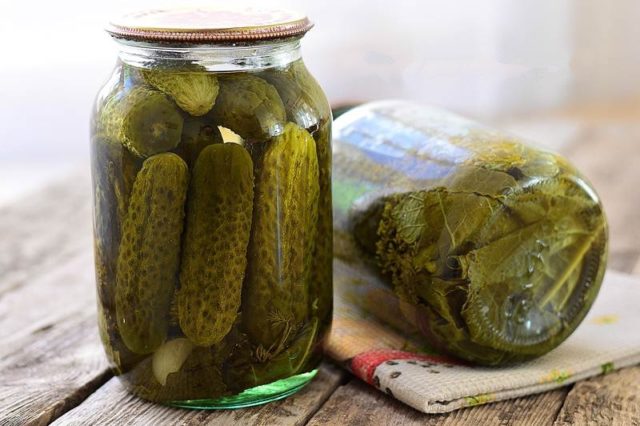
The tightness of the twist is one of the main conditions for high-quality salting.
Molds in conservation
Salted vegetables can become soft after rolling due to mold in the brine. It occurs for many reasons - on poorly washed cucumbers, due to low-quality salt, due to poor container sterilization.
At first, mold looks like a viscous thin film on the brine surface. If the pickles are still firm and still tender, you can try to save the pickle. For this you need:
- drain the liquid from the jar and wash away traces of mold from pickles, and then scald them with boiling water;
- re-sterilize the cans and prepare a new brine by boiling it for several minutes on the stove;
- put the vegetables back in a clean jar and cover with fresh salted brine, and then roll up the container tightly.
If the mold has not had time to seriously damage the pickles and make them soft, then after scalding and re-processing the vegetables will still be suitable for storage.
Errors in the preparation of the brine
When pickling, cucumbers become soft due to the fact that the pickle was not prepared correctly during the preservation process. Housewives often make several common mistakes:
- Lack of salt, cucumbers in this case quickly become soft. For 1 liter of water in a jar, there should be at least 1 large spoonful of salt.
- Lack of vinegar - when pickling vegetables, you need to add at least 70 ml of vinegar per 1 liter of water, otherwise the cucumbers will become soft after a few days. Also, you can not take citric acid instead of vinegar, it can be used in pickling, but does not replace acetic acid.
- Unsuitable salt - pickled and pickled cucumbers are made using common edible salt of universal use, and it is advisable to take coarse salt. "Extra", iodized or sea salt is not suitable, because of them the brine begins to ferment, and the cucumbers acquire a soft consistency.
- Poor water quality. If the cucumbers are soft when salted with cold water, then, most likely, there are impurities in it that negatively affect the quality of the brine. Water for preserving vegetables in a jar is recommended to take purified or well, spring water, with medium hardness.
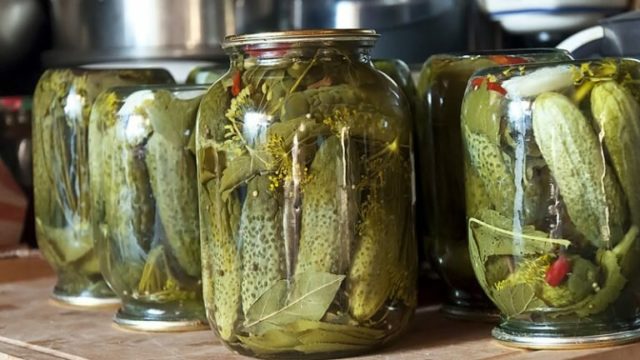
Only high-quality pickle can keep the fruits firm.
For salted vegetables in a jar, it is important to exactly follow the proportions and algorithms indicated in the recipe. If you put too few of the main ingredients in the brine or exceed the recommended amount, the liquid will ferment and the cucumbers will become soft.
Incorrect stacking of cucumbers
If pickled cucumbers are soft, then the ratio of fruits and brine may have been violated during the preservation process:
- If there are too few cucumbers, and there is a lot of liquid, then the vegetables may become overly saturated with brine and will be soft.
- If the pickles in the jar are packed too tightly, and there is not enough brine, and the jar itself is large, then the upper layers of the fruit will strongly press on the lower ones. This will soften the vegetables in the bottom of the jar.
Low-quality cucumbers
The quality of the pickling directly depends on the quality of the cucumbers themselves. Soft pickled cucumbers spoil the workpiece in the following cases:
- the salted fruits were lethargic already in the garden bed, and in the salting they only turned sour completely;
- poorly washed fruits were used for conservation, on which dirt and bacteria remained;
- cucumbers of an unsuitable salad variety went to salting in a jar, such vegetables quickly become soft, since only universal varieties or special cucumbers for pickling can be rolled up for the winter;
- for canning, they took cucumbers with stale barrels, traces of mold, yellow spots and other damage.
Only perfectly healthy, strong fruits torn from the garden bed no later than a day before processing can be rolled up in a jar for the winter. For pickling and salting, small vegetables are suitable, with hard pimples on the skin and dense pulp, for example, varieties Nezhinsky, Rodnichok and others.
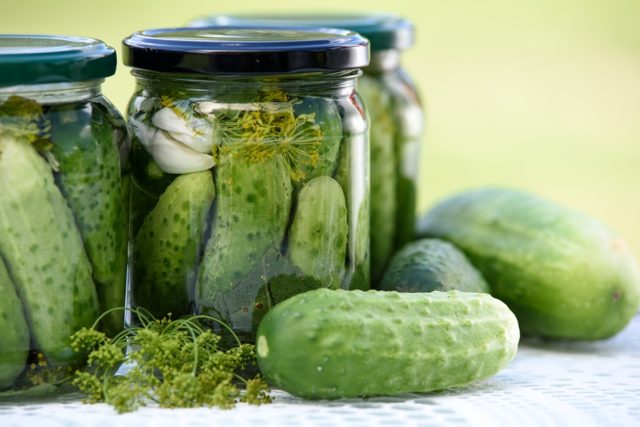
Salad cucumber varieties are not suitable for preservation - you need to take pickled cucumbers
Improper storage
If the pickles in the jar become soft after a certain time after canning, then the storage conditions may have been violated. The fruits become limp from too high a temperature, since lactic acid decomposes in the brine, which, when salted, acts as the main preservative.
It is required to store pickles in cool conditions, at temperatures up to 3-5 ° C. It is best to put the jar in the refrigerator or cellar in the country.
How to salt cucumbers so they are not soft
The classic recipe for salting vegetables suggests using the cold canning method and a minimum set of ingredients:
- Jars and lids are sterilized by steam or in the oven before creating the workpiece.
- Cucumbers of a suitable pickling variety are soaked in cold water for several hours to remove air and possible harmful substances from them.
- Put 2 leaves of horseradish, cherries and black currants in a jar, as well as 2 chopped garlic cloves, a little dill and hot pepper.
- Cucumbers are added to the ingredients and tamped tightly into containers.
- Dissolve 3 large tablespoons of salt in a glass of clean water.
- Pour the ingredients in the jar halfway with cold water, and then add the saline solution and add some more cold water to fill the jar to the end.
The workpiece is covered with a tight lid and immediately placed in the refrigerator. If you follow the recipe exactly, then pickles will turn out crispy.
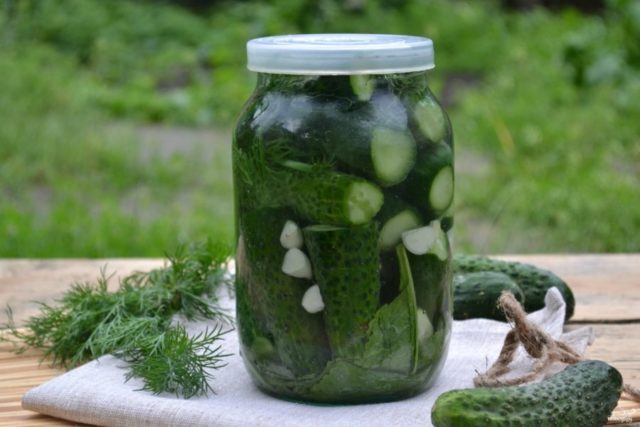
Before harvesting, the fruits must be soaked in water for a long time.
Tips from experienced housewives
A few simple recommendations will help to avoid a situation in which cucumbers become soft after pickling:
- So that the liquid in the jar does not ferment, and the vegetables do not sour, you can add 1 large spoonful of vodka or 5 mustard seeds to the brine.
- To prevent mold, you can put a small piece of horseradish root in the jar on top, in addition, it will give the cucumbers firmness and improve their taste.
- To prevent the appearance of mold and to preserve the hardness of the cucumbers, an aspirin tablet or oak bark is also added to the salting.
- If you cut the tails of the cucumbers before salting, then the brine will quickly reach full readiness.
Experienced housewives recommend sending vegetables harvested from a personal garden or purchased from farmers for canning in jars. Store-bought cucumbers often contain excess nitrates, and in casual markets it is difficult to guarantee that purchased vegetables are of high quality and safe.
Conclusion
Pickles tend to soften in the jar due to several common canning mistakes. Since it is almost impossible to save sour vegetables, it is better to initially follow the technology and not neglect the recommendations in the recipes.








